Overview
The article examines effective treatment strategies for hair loss during menopause, presenting a range of options, including:
- Minoxidil
- Hormone Replacement Therapy (HRT)
- Nutritional changes
It elaborates on how each method addresses hormonal imbalances and promotes hair health. Furthermore, it underscores the significance of a holistic approach in managing hair thinning associated with menopause.
Introduction
Navigating the challenges of menopause can be daunting, particularly regarding the often-overlooked issue of hair loss. Hormonal fluctuations can significantly impact hair health, leading many women to seek effective solutions for thinning hair and restoring vitality.
This article explores nine impactful strategies for managing menopause-related hair loss, providing insights into treatments that include:
- Medications
- Supplements
- Natural remedies
- Lifestyle adjustments
With numerous options at hand, the critical question arises: which methods genuinely yield results and empower women to regain their confidence during this transitional phase?
Tyde Wellness: Personalized Weight Loss Programs for Hormonal Balance
Tyde Wellness offers customized weight reduction programs that include GLP-1 medications, specifically designed for individuals experiencing menopause. These programs focus not only on sustainable weight reduction but also on regulating hormones, which significantly influences overall health and vitality. Clinical trials indicate that individuals utilizing GLP-1 therapies, such as semaglutide, can achieve an average weight reduction of 15% over approximately 15 months, with many experiencing even greater decreases. This is particularly beneficial during menopause, where hormonal imbalances often lead to weight gain and thinning.
The integration of GLP-1 medications with lifestyle changes has shown promising results in clinical studies. For instance, menopausal individuals who combined semaglutide with hormone replacement therapy (HRT) experienced around 30% greater weight loss compared to those using semaglutide alone, as evidenced by the SURMOUNT trials. This combination not only aids in weight management but also helps restore hormonal balance, which is crucial for alleviating menopause-related symptoms, including menopause hair loss treatment for hair thinning.
By emphasizing individualized care, Tyde Wellness empowers individuals to reclaim their health and address the complex challenges of menopause. The program prioritizes flexibility and accessibility, allowing participants to seamlessly integrate their weight reduction journey into their daily lives while enhancing overall well-being. It is essential for participants to consult with a menopause-trained clinician to ensure the safety and effectiveness of their weight management plan. This holistic approach guarantees that individuals not only reach their weight loss goals but also improve their quality of life, establishing Tyde Wellness as a trusted partner in their health transformation.
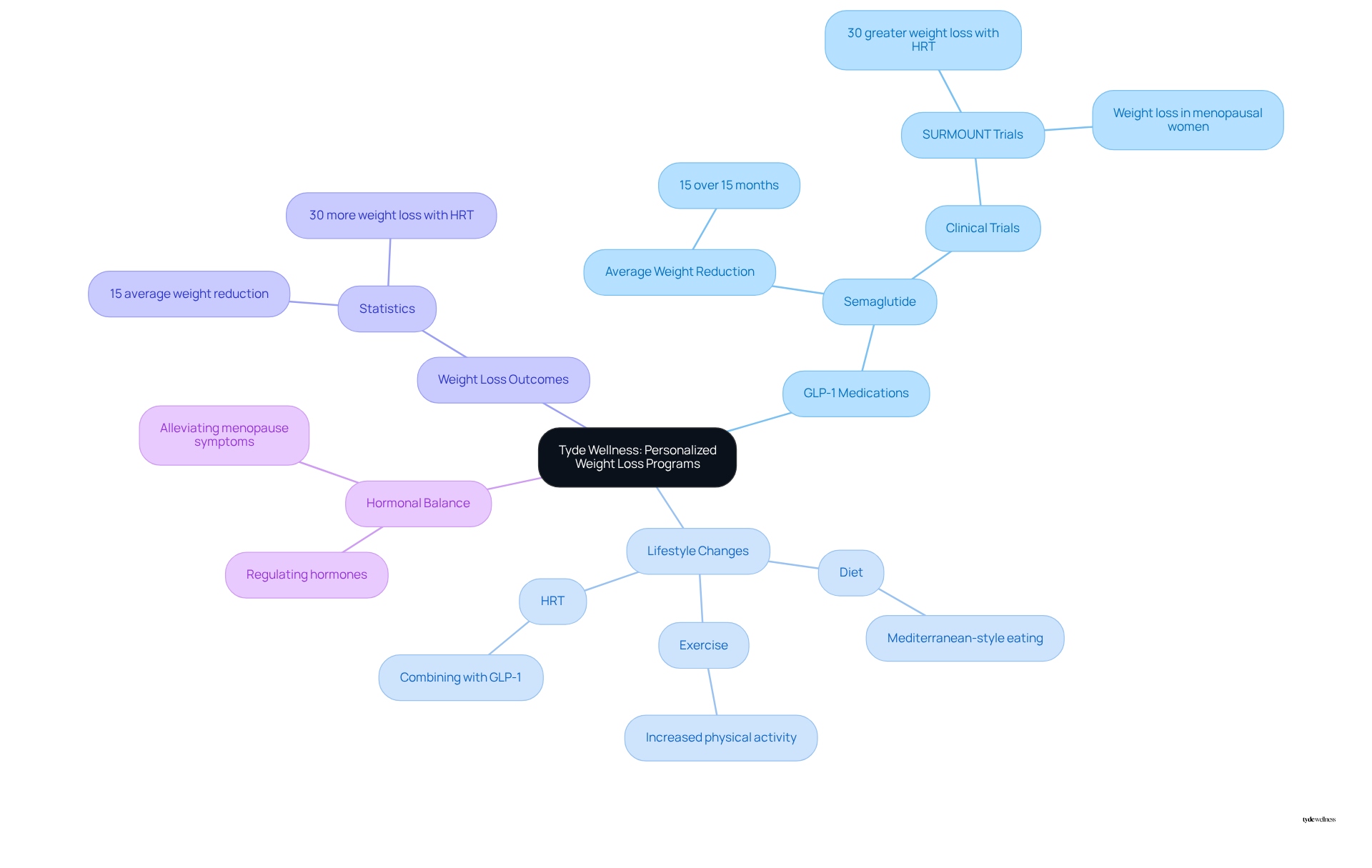
Minoxidil: Topical Solution for Stimulating Hair Growth
Minoxidil, commonly known as Rogaine, is an FDA-approved topical solution designed to promote hair growth by enhancing blood circulation to hair follicles. Available in both foam and liquid forms, it is particularly effective as a menopause hair loss treatment for individuals experiencing thinning hair due to hormonal changes during menopause. Consistent use of Minoxidil can lead to significant improvements in hair density and thickness, making it a preferred treatment option for many. Research indicates that women using Minoxidil often observe a marked increase in hair density, with results typically becoming noticeable within two to four months of regular application.
Early identification and intervention are crucial for effectively managing hair thinning. This underscores the importance of Minoxidil as a key component in menopause hair loss treatment, providing a practical solution for those looking to restore the vitality of their hair during this transitional phase. Furthermore, evaluating alternative therapies such as spironolactone or low-level laser treatment may enhance outcomes, emphasizing the need for a holistic approach to managing thinning hair.
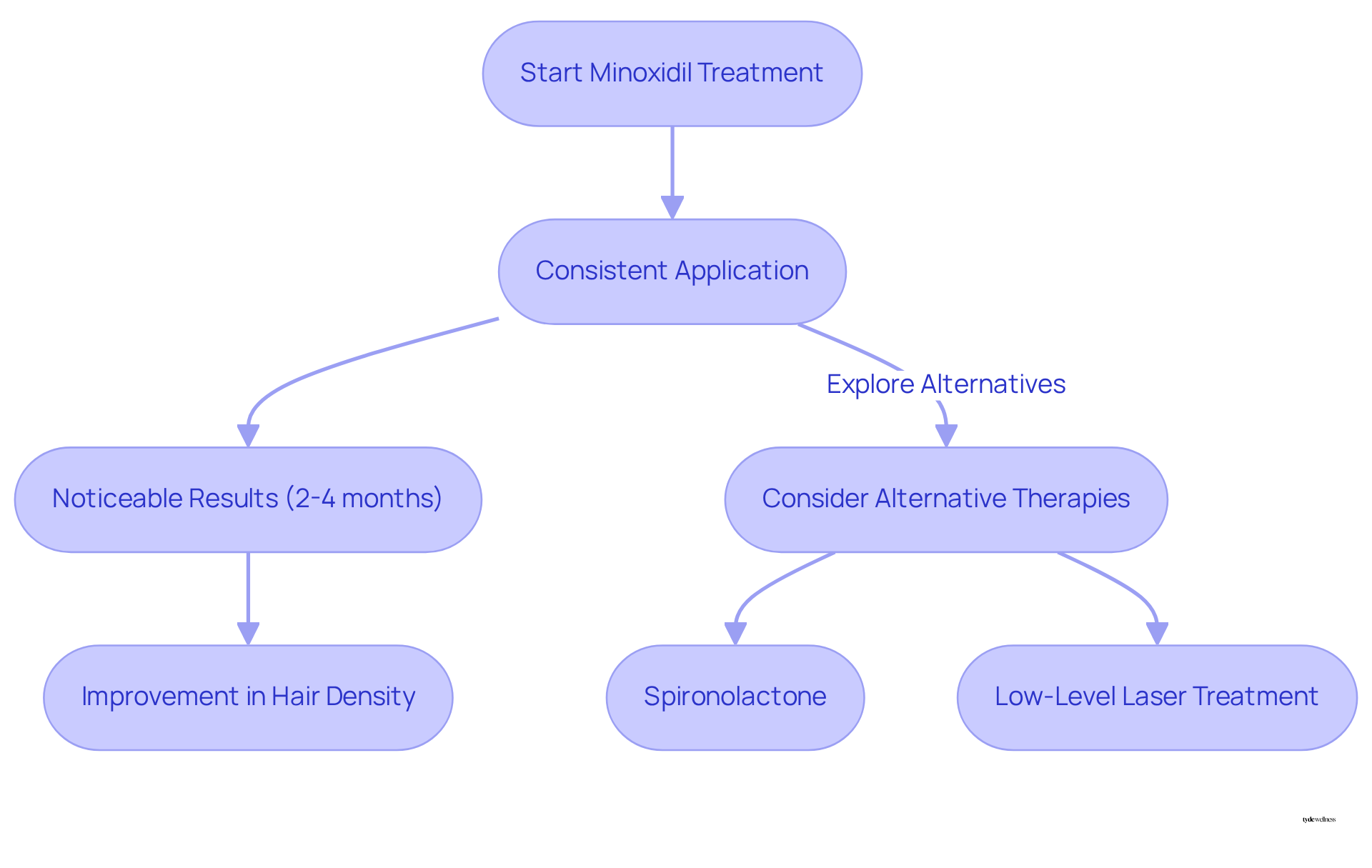
Hormone Replacement Therapy: Restoring Hormonal Balance to Combat Hair Loss
Hormone Replacement Therapy (HRT) is an effective menopause hair loss treatment for individuals experiencing thinning hair during menopause. By reinstating estrogen and progesterone levels, HRT mitigates the hormonal fluctuations that lead to hair thinning. Research indicates that approximately 80% of postmenopausal individuals experience this issue; however, studies reveal that around 60% of women report significant improvements in hair growth and thickness after commencing HRT. This therapy not only addresses follicle loss but also restores hormonal equilibrium, which is essential for maintaining healthy hair growth.
Real-life examples, as documented in case studies, illustrate that women undergoing HRT often experience a revitalization of their hair, with some noting a noticeable increase in density and vitality. However, it is crucial to consider the potential risks and benefits of HRT, as its effectiveness can vary based on individual circumstances. For those facing menopause-related challenges with their hair, consulting a healthcare provider for personalized treatment options can be a valuable next step towards achieving healthier locks.
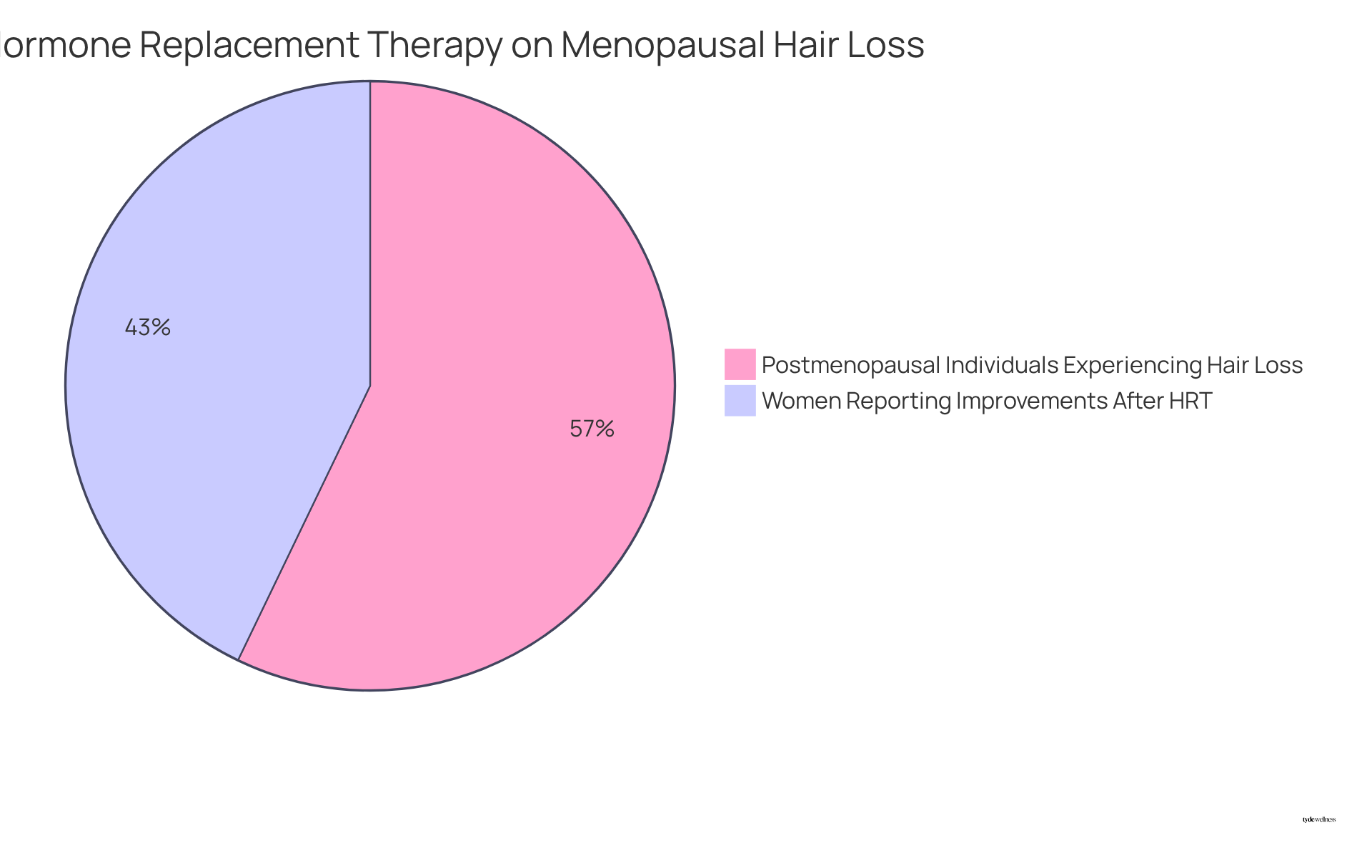
Biotin: Essential Supplement for Strengthening Hair During Menopause
Biotin, also known as vitamin B7, plays a vital role in maintaining healthy hair. It contributes to the production of keratin, a key protein that forms the structure of hair strands. Furthermore, during menopause, women may find that a menopause hair loss treatment, such as biotin supplementation, is beneficial for improving hair quality and reducing thinning. A daily intake of 2,500 to 5,000 mcg is commonly recommended to promote hair growth and enhance overall scalp health.
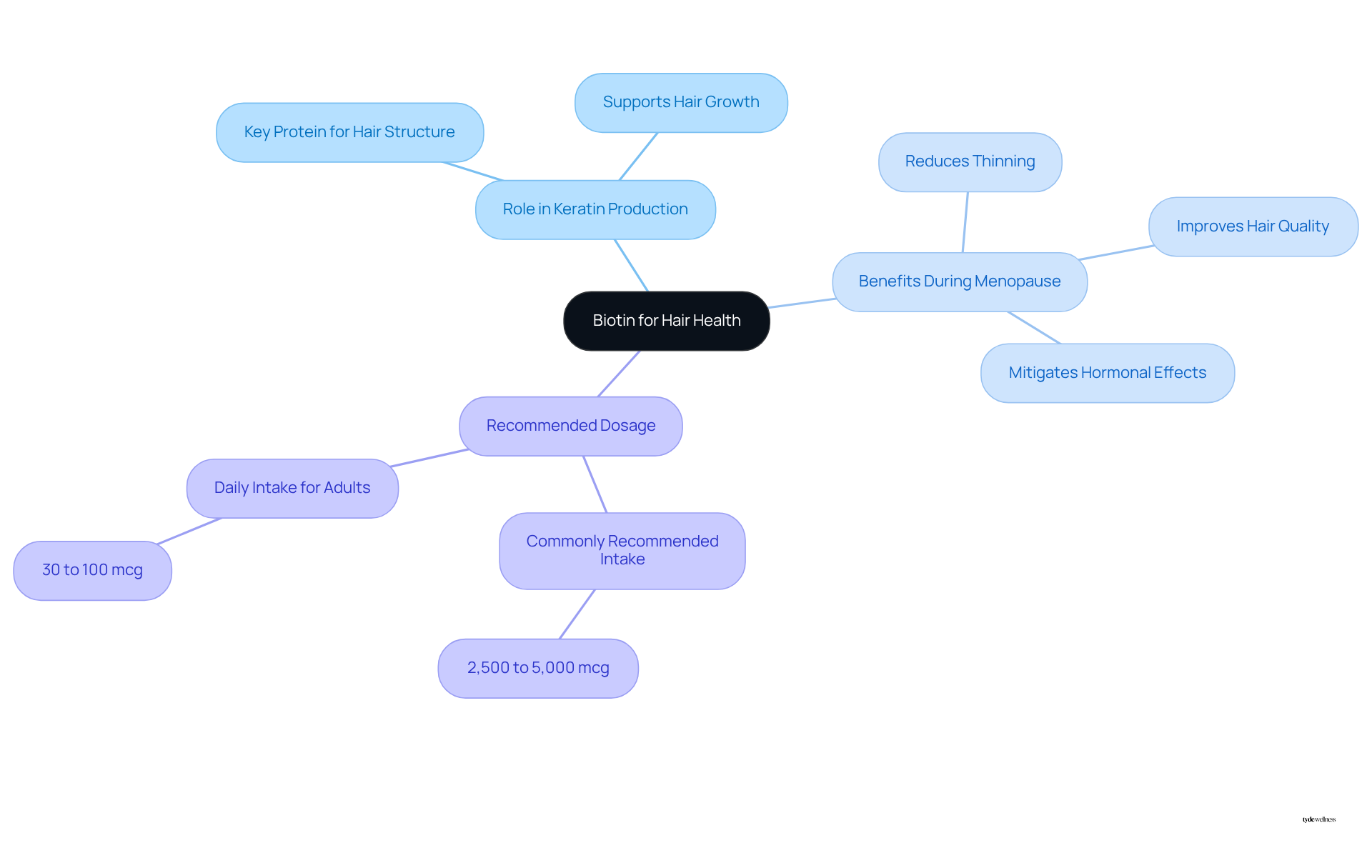
Scalp Massage: Natural Technique to Boost Hair Growth
Scalp massage serves as an effective natural method that stimulates hair follicles and enhances blood circulation to the scalp. By applying gentle pressure and utilizing circular motions, women can improve the delivery of essential nutrients to root cells, thereby fostering hair growth. Research indicates that regular scalp massages, ideally lasting 5-10 minutes daily, can result in noticeable improvements in hair thickness and overall health. For instance, a study involving 38 participants who engaged in daily four-minute scalp massages over a 24-week period reported significant enhancements in strand thickness.
This straightforward yet effective practice can be easily incorporated into any grooming routine. Individuals might consider performing scalp massages while applying conditioner or during their evening skincare regimen. Furthermore, this method not only promotes hair growth but also helps alleviate tension and stress, which is particularly relevant given that tension headaches occur three times more frequently in women than in men. Additionally, scalp massage may contribute to overall well-being by potentially lowering blood pressure and heart rate.
To perform a scalp massage, begin by placing your fingers at the base of your neck and making small circular motions, gradually moving up to the crown of your head. This technique not only fosters growth but also enhances relaxation and stress relief.
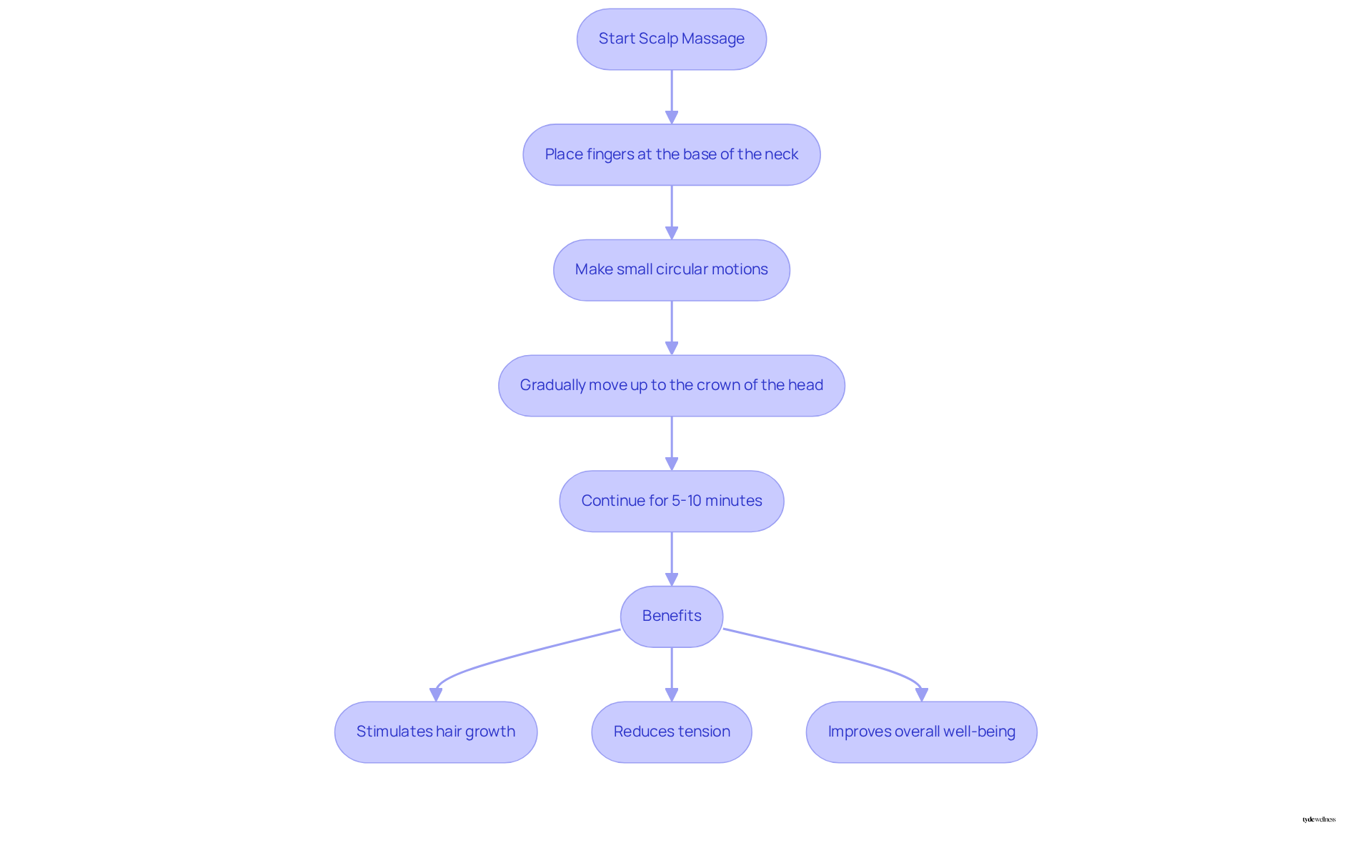
Nutrition: Key Dietary Changes to Support Hair Health
A balanced diet abundant in essential vitamins and minerals is crucial for sustaining healthy tresses during menopause. Essential nutrients, such as omega-3 fatty acids, iron, zinc, and vitamins A, C, and D, contribute important functions in growth and well-being. Including foods like fatty fish, leafy greens, nuts, seeds, and lean proteins in daily meals offers the essential components for strong tresses.
For instance, omega-3 fatty acids present in salmon and walnuts can enhance density. In addition, iron-rich foods such as spinach and lentils improve blood circulation to follicles, combating thinning. Furthermore, staying hydrated and limiting processed foods can further support healthier locks.
Studies show that dietary modifications, including higher protein consumption and the inclusion of supplements like biotin, can positively influence follicle development, making them an important part of menopause hair loss treatment for menopausal individuals. By prioritizing these nutritional strategies, women can effectively tackle challenges related to scalp vitality as part of their menopause hair loss treatment during the transition of aging.
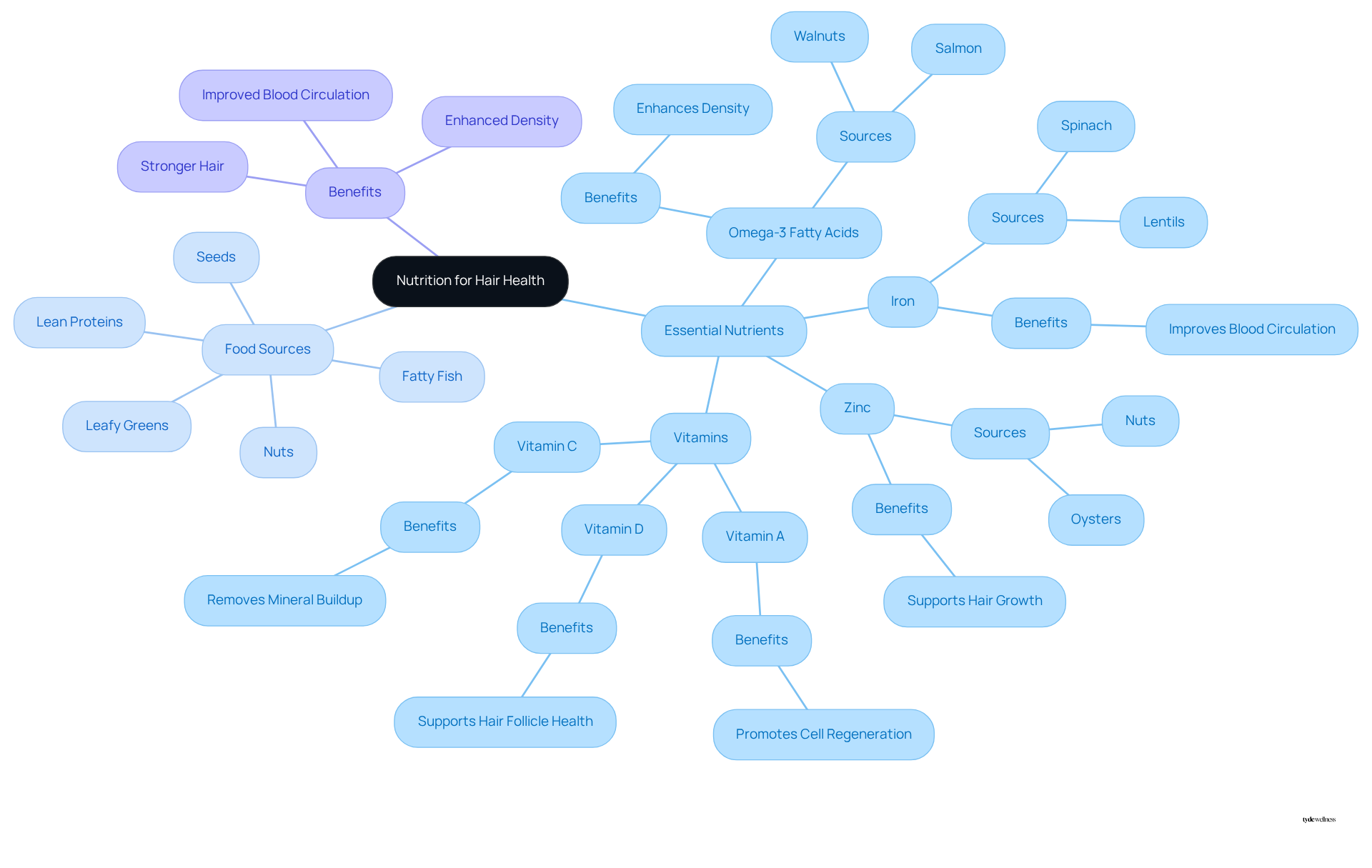
Stress Management: Techniques to Reduce Hair Loss During Menopause
Managing stress is essential for menopause hair loss treatment, as elevated stress levels can significantly impact follicle health and cause shedding during menopause. Studies indicate that elevated cortisol levels, a stress hormone, can hinder follicle growth and lead to increased shedding. In fact, approximately 50% of menopausal women will experience a reduction in their hair during this transitional phase, which may require menopause hair loss treatment.
Methods such as mindfulness, yoga, meditation, and regular physical activity have been shown to effectively reduce stress levels, enhancing overall well-being and potentially benefiting scalp health. Furthermore, hormonal fluctuations during the cessation of menstruation, particularly the reduction in estrogen and progesterone, can exacerbate hair loss, highlighting the importance of menopause hair loss treatment and stress management.
Engaging in hobbies, nurturing relationships, and ensuring adequate sleep are also vital for maintaining mental wellness. Moreover, a balanced diet rich in protein and essential vitamins can promote scalp health during this transition. For instance, individuals who practice yoga consistently report not only lowered stress levels but also improvements in hair quality.
By integrating these practices into their daily routines, individuals can more effectively manage stress and mitigate its negative impacts on scalp wellness, which is crucial for menopause hair loss treatment, fostering a more positive experience during this life stage.
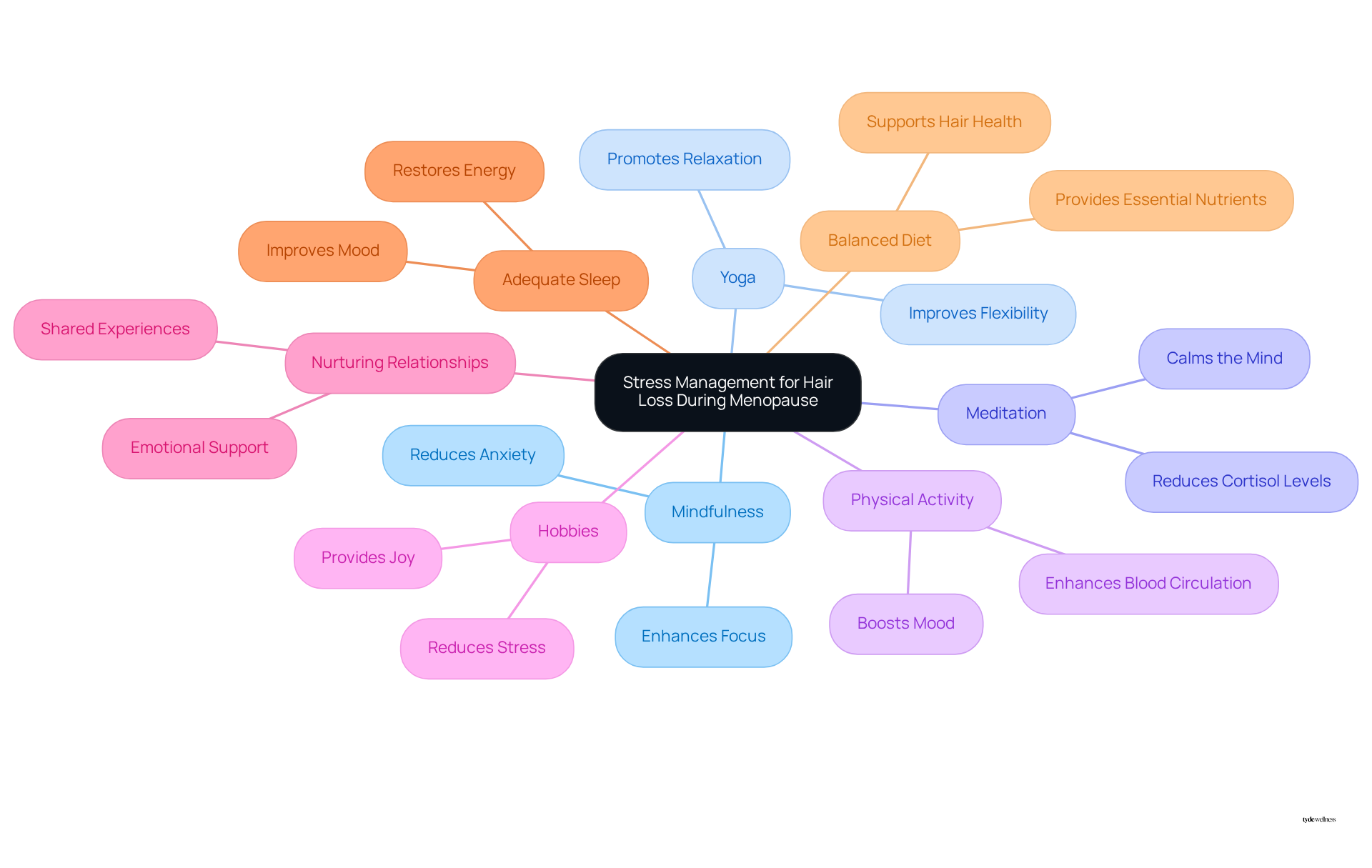
Laser Therapy: Advanced Treatment for Hair Regrowth
Low-level laser therapy (LLLT) has emerged as a promising non-invasive menopause hair loss treatment, especially beneficial for women experiencing hair regrowth during menopause. This therapy utilizes specific wavelengths of light, enhancing blood circulation to scalp follicles and stimulating cellular activity, which effectively rejuvenates dormant follicles. Clinical studies indicate that consistent use of laser caps can lead to an increase in hair growth by up to 51% within 17 weeks. Many users report significant improvements in hair texture and strength.
Furthermore, LLLT is designed to be painless and drug-free, making it a safe option for regular home use. Many users have noted positive experiences with the therapy, underscoring its potential as a viable menopause hair loss treatment for menopausal shedding. Recent advancements in laser technology, such as the HairSmart Grow Laser Cap featuring 272 pure laser diodes, provide deep-penetrating light that supports follicle vitality without hormonal interference.
This innovative method not only stimulates hair follicles but also serves as a menopause hair loss treatment, addressing the emotional distress linked to hair loss and offering a comprehensive solution for women facing the challenges of aging.
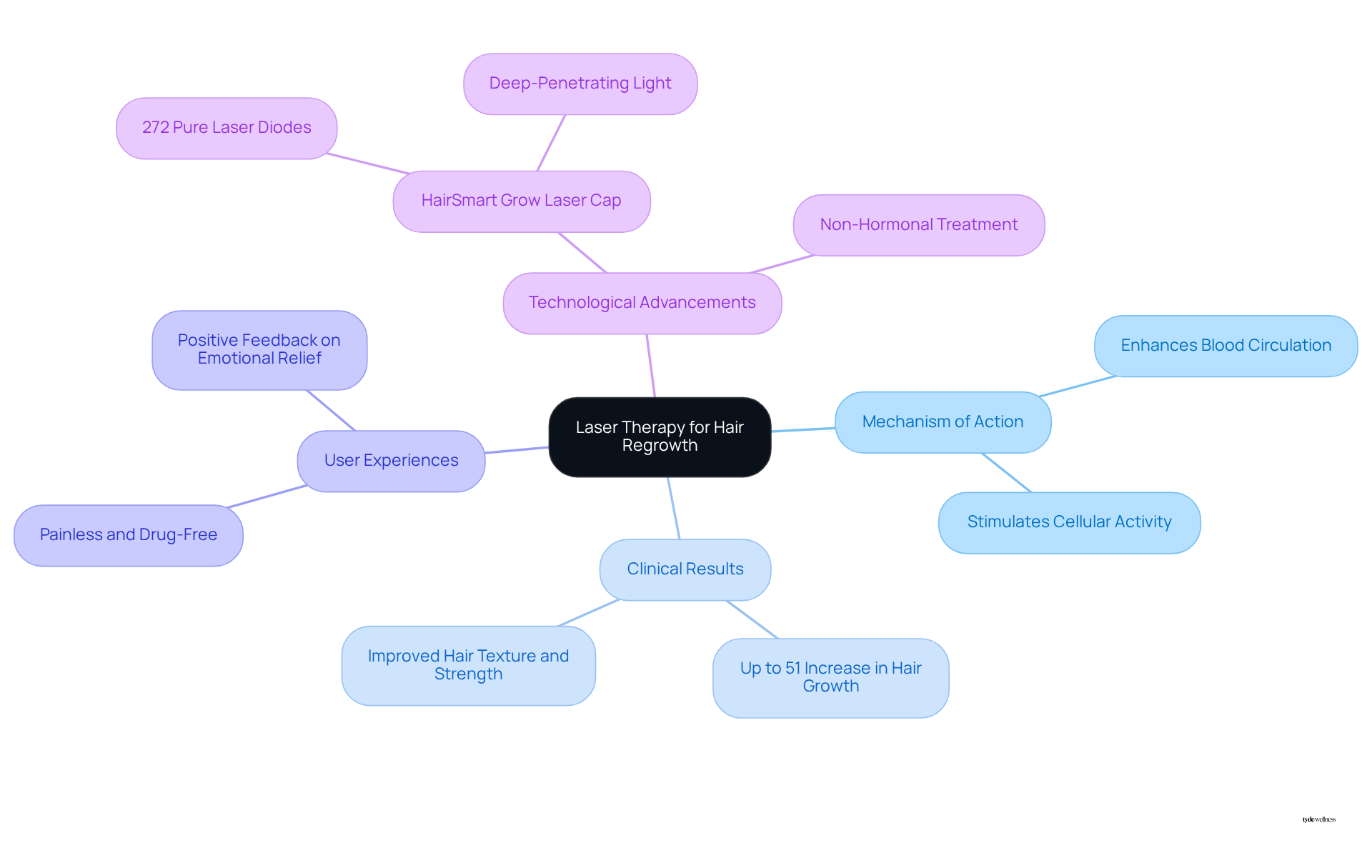
Essential Oils: Natural Remedies for Enhancing Hair Growth
Essential oils, including rosemary, peppermint, and lavender, are increasingly recognized for their ability to stimulate hair growth and enhance scalp health, making them a valuable option in menopause hair loss treatment. Research indicates that rosemary oil can improve circulation around hair follicles, functioning similarly to minoxidil but with fewer side effects. Furthermore, peppermint oil has shown promise in animal studies, resulting in significant follicle growth following topical application.
To utilize these oils effectively, they should be diluted with a carrier oil and massaged into the scalp. This practice not only stimulates hair follicles but also enhances blood flow. Regular application not only promotes hair growth but also provides a calming aromatherapy experience, making it a holistic menopause hair loss treatment.
Statistics reveal a growing number of women incorporating essential oils into their grooming routines, reflecting a shift towards natural solutions. Real-life examples demonstrate that consistent use of these oils can lead to noticeable improvements in scalp health and overall vitality, providing a valuable addition to any menopause hair loss treatment strategy during this life stage.
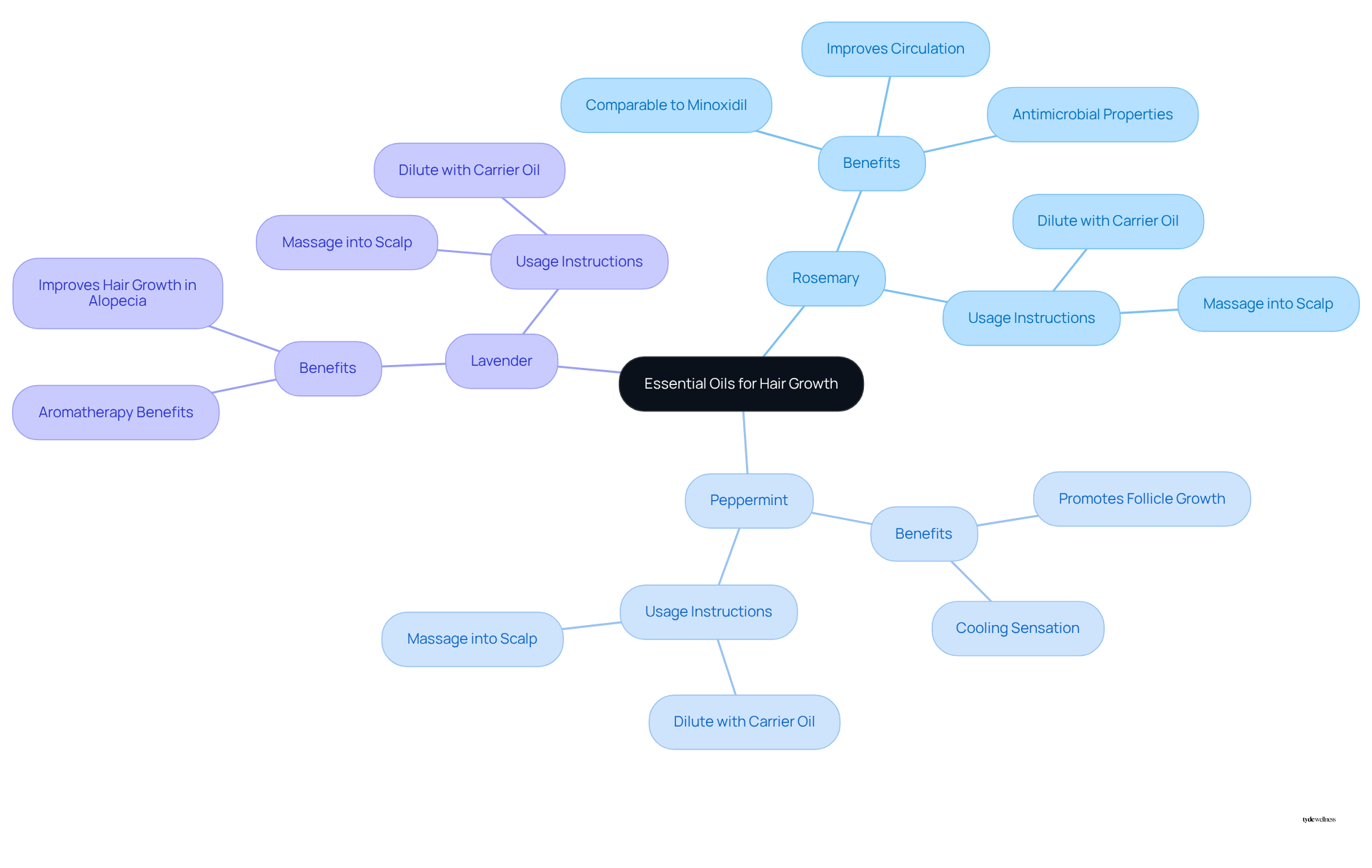
Wigs and Hairpieces: Immediate Solutions for Hair Loss
Wigs and hair accessories serve as prompt and effective solutions for women experiencing thinning hair during transitional phases. Approximately two-thirds of women encounter hair thinning related to aging, making these alternatives essential not only for coverage but also for rebuilding confidence and enhancing overall appearance. Hormonal changes during menopause, particularly the decrease in estrogen and progesterone, can lead to thinning and hair loss, making menopause hair loss treatment essential for maintaining emotional well-being. Many individuals report that using a wig or hair accessory allows them to feel more secure and comfortable while managing extended regrowth strategies.
The process of selecting the right wig can be transformative, providing both style and comfort tailored to individual preferences. Current trends highlight a variety of fashionable options, such as:
- Lace front wigs for a natural appearance
- Headband wigs for easy application
By choosing a wig that aligns with their personal style, women can significantly enhance their confidence and embrace their beauty during this transitional period. Furthermore, utilizing sulfate and paraben-free shampoos and conditioners can contribute to maintaining hair health alongside the use of wigs.
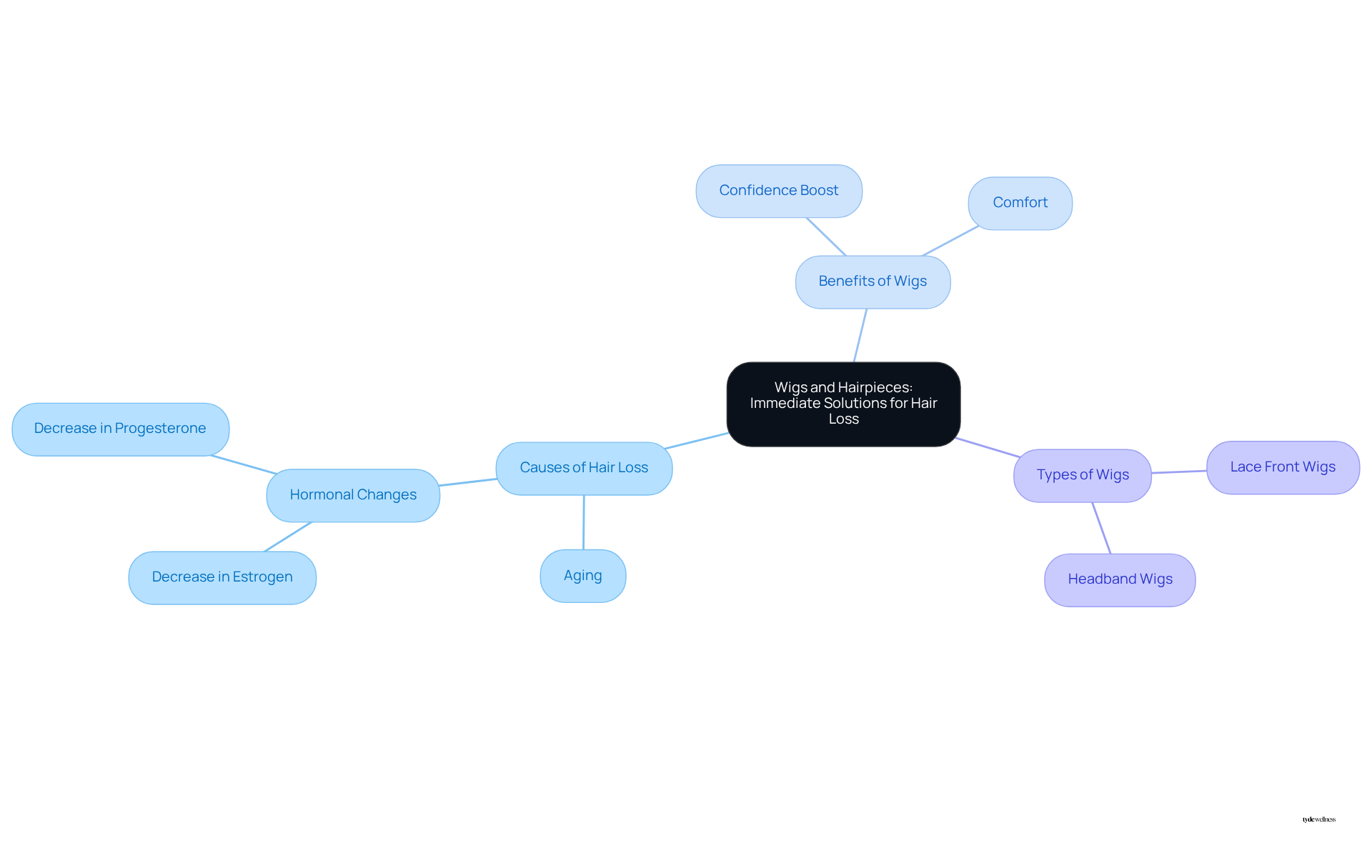
Conclusion
Addressing hair loss during menopause is a multifaceted journey that necessitates a combination of treatments and strategies tailored to individual needs. This article highlights various effective menopause hair loss treatment strategies, including:
- Personalized weight loss programs
- Topical solutions like Minoxidil
- Hormone replacement therapy
- Natural remedies such as biotin and essential oils
Each approach underscores the importance of restoring hormonal balance and nurturing hair health, empowering individuals to take proactive steps in managing their hair during this transitional phase.
Key insights reveal that combining treatments can yield enhanced results. For instance, using Minoxidil alongside hormone therapy or adopting a nutritious diet rich in essential vitamins and minerals can significantly improve outcomes. Furthermore, stress management techniques and practices such as scalp massage are crucial in promoting hair growth and overall well-being. By understanding the interplay between these strategies, individuals can make informed choices that not only address hair loss but also support their overall health during menopause.
Ultimately, the significance of exploring various treatment options cannot be overstated. Embracing a holistic approach to menopause hair loss treatment—one that includes medical interventions, lifestyle changes, and emotional support—can lead to improved outcomes and a renewed sense of confidence. As women navigate this phase of life, prioritizing both hair health and emotional well-being is essential for a more positive experience, encouraging them to reclaim their vitality and embrace their beauty.
Frequently Asked Questions
What services does Tyde Wellness offer for weight loss?
Tyde Wellness offers personalized weight reduction programs that include GLP-1 medications, specifically designed for individuals experiencing menopause. These programs focus on sustainable weight reduction and regulating hormones.
How effective are GLP-1 medications for weight loss during menopause?
Clinical trials indicate that individuals using GLP-1 therapies, such as semaglutide, can achieve an average weight reduction of 15% over approximately 15 months, with many experiencing even greater decreases.
What additional benefits do GLP-1 medications provide when combined with hormone replacement therapy (HRT)?
Menopausal individuals who combined semaglutide with HRT experienced around 30% greater weight loss compared to those using semaglutide alone, helping to restore hormonal balance and alleviate menopause-related symptoms.
What is the importance of consulting a menopause-trained clinician at Tyde Wellness?
It is essential for participants to consult with a menopause-trained clinician to ensure the safety and effectiveness of their weight management plan, allowing for a tailored approach to their health transformation.
What is Minoxidil and how does it aid in hair growth?
Minoxidil, commonly known as Rogaine, is an FDA-approved topical solution that promotes hair growth by enhancing blood circulation to hair follicles. It is particularly effective for individuals experiencing thinning hair due to hormonal changes during menopause.
How long does it take to see results from using Minoxidil?
Consistent use of Minoxidil can lead to noticeable improvements in hair density and thickness within two to four months of regular application.
What role does Hormone Replacement Therapy (HRT) play in managing hair loss during menopause?
HRT reinstates estrogen and progesterone levels, mitigating hormonal fluctuations that lead to hair thinning. Approximately 60% of women report significant improvements in hair growth and thickness after commencing HRT.
Are there any risks associated with Hormone Replacement Therapy?
While HRT can be effective in restoring hormonal balance and promoting hair growth, it is crucial to consider the potential risks and benefits, as its effectiveness can vary based on individual circumstances. Consulting a healthcare provider for personalized treatment options is advisable.
List of Sources
- Tyde Wellness: Personalized Weight Loss Programs for Hormonal Balance
- Menopause Hormone Therapy Boosts GLP-1 Drug Effectiveness, Researchers Say (https://usnews.com/news/health-news/articles/2025-07-14/menopause-hormone-therapy-boosts-glp-1-drug-effectiveness-researchers-say)
- GLP-1 and Menopausal Hormone Therapy: A Powerful Combination (https://myalloy.com/blog/why-glp-1s-and-mht-are-a-beneficial-combination?srsltid=AfmBOoqWBOI4eziPinx04TvxykGnjmCwJgOtf4MG9uZCM3Dy6D3IyzdL)
- Women in Menopause Benefit From GLP-1 Weight-Loss Medications as Much as Younger Women | Research | Advances in Endocrinology, and Women’s Health | NewYork-Presbyterian (https://nyp.org/advances/article/women-in-menopause-benefit-from-glp-1-weight-loss-medications-as-much-as-younger-women)
- Semaglutide and Weight Loss in Menopause (https://news-medical.net/health/Semaglutide-and-weight-loss-in-menopause.aspx)
- Semaglutide and Menopause: Does It Work? (https://joinmidi.com/post/semaglutide-and-menopause)
- Minoxidil: Topical Solution for Stimulating Hair Growth
- Female pattern hair loss common during menopause, reversible if promptly treated (https://healio.com/news/womens-health-ob-gyn/20240913/female-pattern-hair-loss-common-during-menopause-reversible-if-promptly-treated)
- Treating female pattern hair loss – Harvard Health (https://health.harvard.edu/staying-healthy/treating-female-pattern-hair-loss)
- A randomized, placebo-controlled trial of 5% and 2% topical minoxidil solutions in the treatment of female pattern hair loss – PubMed (https://pubmed.ncbi.nlm.nih.gov/15034503)
- An Expert Answers Your Questions on Hair Loss — and How to Reverse It (https://katiecouric.com/health/best-hair-products-for-growth-and-thickness)
- Hormone Replacement Therapy: Restoring Hormonal Balance to Combat Hair Loss
- Menopause and Hair Loss: Causes + Treatments (https://joinmidi.com/post/menopause-and-hair-loss)
- Menopause, Hair Loss & Hormone Therapy – SottoPelle Hormone Replacement Metho (https://sottopelletherapy.com/blog/menopause-hair-loss-hormone-therapy)
- What to know about HRT and hair loss (https://medicalnewstoday.com/articles/hrt-and-hair-loss)
- Does HRT Help With Hair Loss? | Wimpole Clinic (https://wimpoleclinic.com/blog/does-hrt-help-with-hair-loss)
- Biotin: Essential Supplement for Strengthening Hair During Menopause
- Why You Need Biotin in Menopause (https://womaness.com/blogs/resources/why-you-need-biotin-in-menopause?srsltid=AfmBOoq38Gj0QBBhPhFlZHKREBb0qlXHt7zmJ_bgW0q7anzbmRjfltwY)
- Biotin For Menopause Hair and Skin | Biotin Benefits Women | Bonafide (https://hellobonafide.com/blogs/news/biotin-for-menopause-hair-and-skin)
- Menopause And Hair Loss: What You Need to Know (https://goldielocks.com/blogs/news/menopause-hair-loss)
- Can You Lose Your Hair Because of Menopause? (https://verywellhealth.com/menopause-hair-loss-5218350)
- Scalp Massage: Natural Technique to Boost Hair Growth
- Genius Scalp Tip for Thicker Hair Post-50, According to a Cosmetic Chemist (https://parade.com/living/scalp-tip-for-thicker-hair-post-50-according-to-cosmetic-chemist)
- Scalp Massage for Hair Growth: Does It Really Work? (https://healthline.com/health/scalp-massage-for-hair-growth)
- Can Massaging Your Scalp Improve Hair Growth? (https://health.com/scalp-massage-8424494)
- Reverse Hair Loss and De-Stress With a DIY Scalp Massage (https://womansworld.com/wellness/health-benefits-of-scalp-massage-hair-growth-and-more)
- Scalp Massage for Hair Growth: Benefits & Tips (https://hims.com/blog/massaging-scalp-help-hair-growth)
- Nutrition: Key Dietary Changes to Support Hair Health
- Yes, menopause could be ruining your hair — here’s how to fix it (https://nbcnews.com/select/shopping/menopause-hair-rcna198644)
- Hair Loss Due to Menopause: What to Do About It – GoodRx (https://goodrx.com/conditions/menopause/hair-loss-in-menopause?srsltid=AfmBOoqzqL0xHPF1OHDapjjmExt5ZVR_A58ajkxgDNM9db66yF9XV4MU)
- 10 Nutrients for Healthy Hair During Menopause – Marion Gluck (https://mariongluckclinic.com/blog/healthy-hair-during-menopause.html)
- Menopause Diet | Best Vitamins For Skin And Hair | Bonafide (https://hellobonafide.com/blogs/news/best-nutrients-for-hair-and-skin-health)
- Hair Loss During Menopause? Here’s What You Can Do About It – Time Clinic (https://time-clinic.com/blog/clinic-news/hair-loss-during-menopause-heres-what-you-can-do-about-it)
- Stress Management: Techniques to Reduce Hair Loss During Menopause
- Managing Menopause: Tackling Hair Loss and Skin Discomfort (https://jaylahealth.com/managing-menopause-tackling-hair-loss-and-skin-discomfort)
- Menopause Hair Loss: Are You At Risk? (https://winksbeaute.com/blogs/haircare-trending-news/menopause-hair-loss-are-you-at-risk-1?srsltid=AfmBOoribfbkIjrikbyE-zt_qLFsHBQVjtTmViN2rDtKg8AjC6Dt05Rh)
- How Can I Manage My Menopausal Hair Loss?: Inga Zilberstein, MD: Gynecology (https://drzilberstein.com/blog/how-can-i-manage-my-menopausal-hair-loss)
- How To Handle Menopausal Hair Loss (https://axiawh.com/resources/how-to-handle-menopausal-hair-loss)
- Australian Menopause Centre | Understanding Menopausal Hair Loss: Causes, Management, and Coping Strategies (https://menopausecentre.com.au/understanding-menopausal-hair-loss-causes-management-and-coping-strategies)
- Laser Therapy: Advanced Treatment for Hair Regrowth
- Does Menopause Cause Hair Loss: Will Hair Loss Grow Back? (https://theradome.com/blogs/blog/menopause-hair-loss?srsltid=AfmBOoqhforya7PR0AbQ9sSqqd9g7-KR-dUPtJ2YQ_Dyx7eYo9beTbnm)
- Laser Treatment for Hair Loss: Does It Work? (https://healthline.com/health/laser-treatment-for-hair-loss)
- Why Low-Level Laser Therapy (LLLT) is a Game-Changer for Women’s Hair Loss (https://myhairsmart.com/blogs/news/why-low-level-laser-therapy-lllt-is-a-game-changer-for-womens-hair-loss)
- Laser Therapy for Menopausal Hair Loss: A Comprehensive 2025 Guide to Regrowth (https://clinicadvisor.com/laser-hair-growth/laser-therapy-menopausal-hair-loss)
- Essential Oils: Natural Remedies for Enhancing Hair Growth
- 12 Proven Ways To Reverse Thinning Hair After Menopause (https://wimpoleclinic.com/blog/proven-ways-to-reverse-thinning-hair-after-menopause)
- Essential Oils for Hair (https://healthline.com/health/essential-oils-for-hair-growth)
- 10 Essential Oils Proven to Enhance Hair Growth and Health (https://verywellhealth.com/10-essential-oils-for-hair-growth-and-health-8729697)
- The Independent Pharmacy – The Safe & Trusted Online Pharmacy (https://theindependentpharmacy.co.uk/menopause-hrt/guides/how-to-reverse-thinning-hair-after-the-menopause)
- The best essential oils for hair growth: Do they work? (https://medicalnewstoday.com/articles/321877)
- Wigs and Hairpieces: Immediate Solutions for Hair Loss
- Menopause and Wigs: Your Secret Weapon Against Hair Loss – Salon La Reine (https://salonlareine.com/blog/menopause-and-wigs-your-secret-weapon-against-hair-loss)
- Grapevine Entrepreneur Launches Wig Line After Hair Loss (https://nbcdfw.com/news/local/grapevine-entrepreneur-creates-product-after-suffering-hair-loss/1963727)
- Wigs: Your Secret Weapons for Hiding Menopausal Hair Loss (https://instantarewahair.com/blogs/news/wigs-your-secret-weapons-for-hiding-menopausal-hair-loss)
- Menopause and Hair Loss: Causes and Treatments | Belorens (https://belorens.com/blog/why-menopause-causes-hair-loss-and-how-to-address-it)



